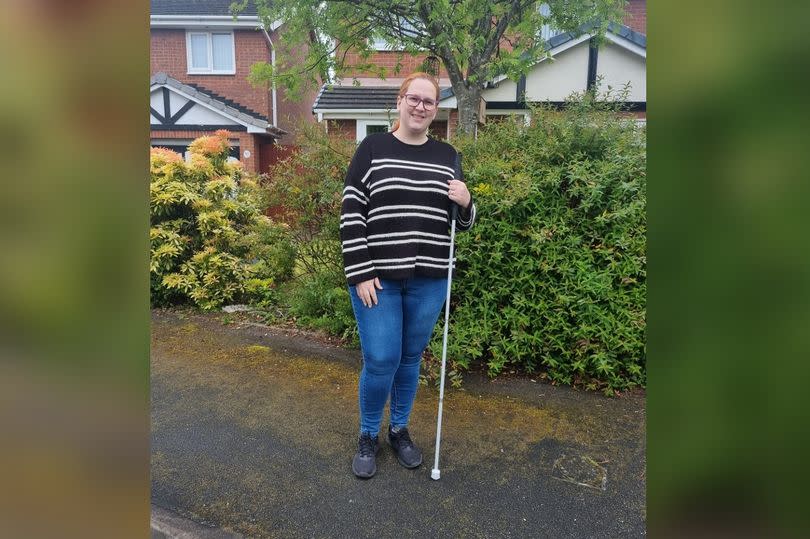Mum thought her life was over after answering phone call

A mum with a rare brain condition said she "shut down" after receiving a phone call informing her she was going to be registered as blind.
Rebecca Lennox, from Halewood, was diagnosed with idiopathic intracranial hypertension in 2022 after experiencing blurred vision and headaches. She was registered severely sight impaired in 2023 and says she now often relies on assistance from others to get out and about, adding she often accidentally walks into things like A boards left in the middle of the pavement.
However, the 32-year-old is determined to live independently and to be a great mum to her kids. She has now helped RNIB (Royal National Institute of Blind People) to put together a ‘Be Helpful’ guide to help sighted people know what to do if they see someone with sight loss out and about.
READ NEXT: Rescue mission launched after car drifts out to sea
READ NEXT: Expert reveals the best wines at supermarkets and the one that is 'worse than cold sick'
She said: “After I was diagnosed, I just completely shut down. When I got a phone call to say I was going to be registered as blind, I just said, ‘no, I’m not’.
"It sounds dramatic but I thought my life was over. I thought I wouldn't be able to walk, drive, do things with my kids but my family really supported me and told me that we'd manage."
Rebecca shut herself away almost completely for a year but eventually realised she had to adapt to her situation. She said: "I was relying on others and thought, 'this isn't going to change'. I needed to navigate this new world by myself."
The first time Rebecca went out in the city centre with her white cane - known as a symbol cane - someone tried to pull her across the road when she was waiting for traffic lights to change.
She said: “Losing my sight so young, there’s a lot of misconceptions about it, so it’s really important we get some basic awareness out there for people that’s not too detailed and if they want to help it gives them a quick overview of how to do that.
“It’s just little things that we might need a bit of help with. I think because I’m young, people often assume I can see, so if I’m at a bus stop asking people what number is on the bus, people might say, ‘well it’s right there on the bus!’.
“And on the new type of trains in my area, there is a step up to get on and I have fallen into the train a few times. When I first went to get off, I had to press a button and people were getting impatient saying, ‘you’ve got to press that button there!’. I was saying, ‘I can’t see that!’.
She continued: “So just ask us! We’re not going to get offended by people asking if we need help.”
Rebecca was a student nurse, student midwife and a phlebotomist before her diagnosis but now works as an emergency medical advisor for 999. She added: "I always wanted to help in healthcare and with my current job I still can do.
"It's really nice to be part of a public campaign and it's enjoyable to lend my experience to others in a similar situation. My eyesight's getting worse but my feelings are getting better. There is support and people who are willing to help."
The Be Helpful guide is backed up by new research commissioned by RNIB which shows the majority of blind and partially sighted people would like sighted people to offer assistance, and that a simple hello and offer of help is the best way to go about it.
Almost half (43%) said they would like sighted people to offer assistance at train stations and 39% at bus stops. A third of people said assistance would be welcome when on a pavement with obstacles such as bins, pavement parking, or approaching scooters (30%).
When asked "what are the main things people forget to do when trying to guide you", forgetting to give verbal directions or introduce themselves came top. Almost a third (28%) said that people "forget to talk to me directly and not my companion or guide dog", while almost a quarter (23%) said that people "forget to say goodbye".
The campaign film features actors with sight loss and uses everyday relatable experiences: navigating A-boards on the high street, waiting for a bus, dodging cars parked on pavements, bumping into unexpected bins, and attempting to locate milk at the local shop, to highlight these challenges and encourage people to download the guide.
David Aldwinckle, RNIB’s Director of Insight and Customer Voice, said: “Whilst most people with sight loss, like me, have worked out ways to get around as independently as we can, that doesn’t mean help isn’t welcome.
“When somebody asks me at the bus stop if I need any help, I really appreciate it. Just that small recognition that help might be useful makes me feel like I belong and am part of the community. There are times when help is really important.
"When walking through a busy and crowded underground station you sometimes have to guess which is the right way to go which raises feelings of anxiety. A quick ‘hello’ and question of ‘do you need a hand?’ means I can ask if I’m going the right way and it makes such a difference.”
For more information on the Be Helpful guide, visit: www.rnib.org.uk/behelpfulguide
Don't miss the biggest and breaking stories by signing up to the Echo Daily newsletter here

 Yahoo News
Yahoo News 
